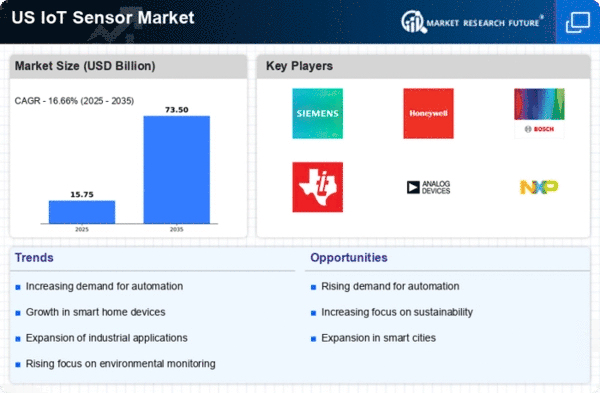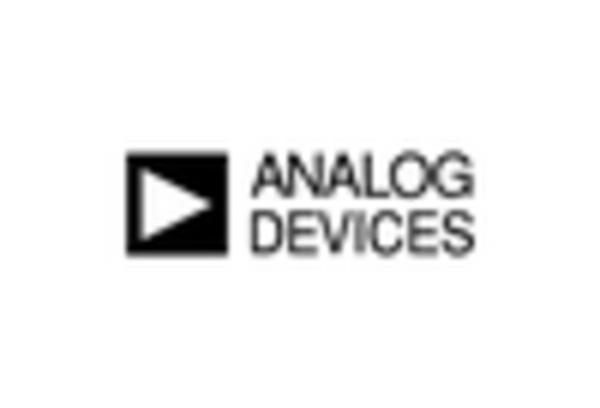Rising Demand for Automation
The increasing demand for automation across various sectors is a pivotal driver for This market. Industries such as manufacturing, agriculture, and logistics are increasingly adopting automated solutions to enhance efficiency and reduce operational costs. In the manufacturing sector alone, the market for automation technologies is projected to reach approximately $200 billion by 2026. This trend is likely to propel the adoption of IoT sensors, which are essential for real-time monitoring and control of automated systems. As businesses seek to optimize their processes, the integration of IoT sensors becomes crucial, thereby driving growth in the iot sensor market.
Growing Focus on Energy Efficiency
The growing focus on energy efficiency is a significant driver for This market. As organizations strive to reduce energy consumption and lower operational costs, IoT sensors play a crucial role in monitoring and managing energy usage. For example, smart building technologies that utilize IoT sensors can lead to energy savings of up to 30%. This trend is particularly evident in the commercial real estate sector, where the integration of IoT solutions is becoming increasingly common. The emphasis on sustainability and energy efficiency is likely to propel the demand for IoT sensors, thereby fostering growth in the iot sensor market.
Increased Investment in Smart Infrastructure
Increased investment in smart infrastructure is a key driver for This market. Governments and private entities are allocating substantial funds towards the development of smart cities and infrastructure projects. For instance, the US government has proposed investments exceeding $1 trillion in infrastructure improvements, which include smart technologies. This investment is expected to enhance urban living through improved transportation systems, waste management, and public safety, all of which rely on IoT sensors for data collection and analysis. As these projects progress, the demand for IoT sensors is likely to surge, further stimulating the growth of the iot sensor market.
Emergence of Predictive Maintenance Solutions
The emergence of predictive maintenance solutions is transforming the landscape of This market. Industries are increasingly adopting IoT sensors to monitor equipment health and predict failures before they occur. This proactive approach can lead to significant cost savings, with estimates suggesting that predictive maintenance can reduce maintenance costs by up to 25%. As organizations recognize the value of minimizing downtime and extending equipment lifespan, the adoption of IoT sensors for predictive maintenance is expected to rise. This trend is likely to drive substantial growth in the iot sensor market, as more companies seek to implement these advanced solutions.
Advancements in Wireless Communication Technologies
Advancements in wireless communication technologies, such as 5G, are significantly impacting This market. The deployment of 5G networks is expected to enhance connectivity and data transfer speeds, facilitating the use of IoT sensors in various applications. For instance, the latency reduction offered by 5G can improve real-time data processing, which is vital for applications in smart cities and industrial automation. As of 2025, it is estimated that 5G will cover over 50% of the US population, creating a favorable environment for the proliferation of IoT sensors. This technological evolution is likely to drive innovation and expansion within the iot sensor market.















